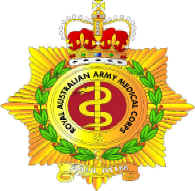
Rosemary Follett is an Australian former politician who was the first Chief Minister of Australian Capital Territory, serving in 1989 and again between 1991 and 1995. She was the first woman to become head of government in an Australian state or territory.

The Royal Australian Army Medical Corps (RAAMC) is the branch of the Australian Army responsible for providing medical care to Army personnel. The AAMC was formed in 1902 through the amalgamation of medical units of the various Australian colonies and was first deployed to South Africa as a small detachment of personnel supporting the Australian Commonwealth Horse during the Second Boer War. The corps has participated in every Australian Army operation since then, including wars and peacekeeping operations. The "Royal" prefix was granted in 1948.

St George Girls' High School (SGGHS) is a government-funded single-sex academically selective secondary day school for girls, located in Kogarah, in the southern suburbs of Sydney, New South Wales, Australia.
The London School of Medicine for Women (LSMW) established in 1874 was the first medical school in Britain to train women as doctors. The patrons, vice-presidents, and members of the committee that supported and helped found the London School of Medicine for Women wanted to provide educated women with the necessary facilities for learning and practicing midwifery and other branches of medicine while also promoting their future employment in the fields of midwifery and other fields of treatment for women and children.
Justin Fleming is an Australian playwright, librettist and author. He has written for theatre, music theatre, opera, television and cinema and his works have been produced and published in Australia, the US, Canada, the UK, Belgium, Poland and France. Fleming has been a barrister and vice president of the Australian Writers' Guild and a board member of the Australian National Playwrights' Centre. He is a member of the Honorable Society of King’s Inns, Dublin.

Gwenyth Valmai Meredith OBE, also known by her married name Gwen Harrison, was an Australian writer, dramatist and playwright, and radio writer. She is best known for her radio serials The Lawsons (1944–1949) and the longer-running Blue Hills (1949–1976).
Corporal Betty Cameron was an Australian World War II servicewoman and WAAAF activist. Born as Elizabeth Katherine Twynam-Perkins, she was educated at Fort Street Girls' High School, Sydney and obtained her Leaving Certificate. From 1938 to 1940 she was a lady cubmaster.

Sir Lorimer Fenton Dods was a pioneer of specialised health care for children who founded, with assistance from Dr John Fulton and Douglas Burrows, the Children's Medical Research Foundation. He is considered one of Australia's most influential paediatricians.
Dame Joyce Margaretta Daws DBE FRCS FRACS FAMA was an Australian-based British doctor who specialised in thoracic surgery at various hospitals for over twenty years, primarily in Melbourne. She held the post of Consultant Surgeon of Melbourne.
Dr Henry Windsor was an Irish-born Australian cardiac surgeon. He trained at Queensland University and then the University of Sydney, gaining second-class honours in medicine and graduating in 1939 with a Bachelor of Medicine.

Birralee is the name of two mansions in Adelaide which were associated with William Burford.

The Royal Australian Air Force Nursing Service (RAAFNS) was a branch of the Royal Australian Air Force, which existed from 1940 to 1946, and from 1948 to 1977. Members served in World War II, the Korean War, the Malayan Emergency, and the Vietnam War.

Laura Elizabeth Forster (1858–1917) was an Australian medical doctor, surgeon and nurse noted for her service in France, Belgium, Turkey and Russia during World War I.

Phyllis Margery Anderson was an Australian pathologist.

Rosalie Slaughter Morton was an American physician, surgeon, and author. In addition to running her own medical practices, she became the first woman appointed as Attending Surgeon at the College of Physicians and Surgeons at Columbia University in 1916, and became the first chairperson of the American Women's Hospitals Service the following year. Morton served as a medic during the First World War, and was the first chair of the Public Health Education Committee. She was also one of the first women to join the faculty, and to later become a professor, at the Polyclinic Hospital of New York.
The Victorian Medical Women's Society (VMWS) is the longest-running association of women medical practitioners and medical students. It was established in Melbourne, Australia in 1896 and is one of the oldest active medical organisations in the world. The aim of the society was to set a benchmark in women's health around Victoria, and to advance the professional development of medical women, through education, research, and the improvement of professional opportunities. The state-run society became affiliated with the national body, Australian Federation of Medical Women, and thereby the Medical Women's International Association.

Arthur Tudor Edwards was a Welsh thoracic surgeon, who worked at the Westminster Hospital, the Royal Brompton Hospital and Queen Mary's Hospital, Roehampton and pioneered lung surgery, in particularly pulmonary tuberculosis and lung tumours.
Margery Scott-Young was an Australian surgeon at Sydney's Rachel Forster Hospital. She served as a major in the Royal Australian Army Medical Corps during the Second World War.

John Vivian Fitzhenry Lusby (1913–1980), known as "Jack", was an Australian cartoonist, journalist and short story writer who served as a pilot in the Royal Australian Airforce during World War II.
Air Vice Marshal Tracy Lee Smart, is an Australian physician, medical administrator, and a retired senior officer in the Royal Australian Air Force (RAAF). She served as Commander of Joint Health Command and Surgeon General of the Australian Defence Force from December 2015 to December 2019. Smart was the third woman to reach the rank of air vice marshal in the RAAF.












